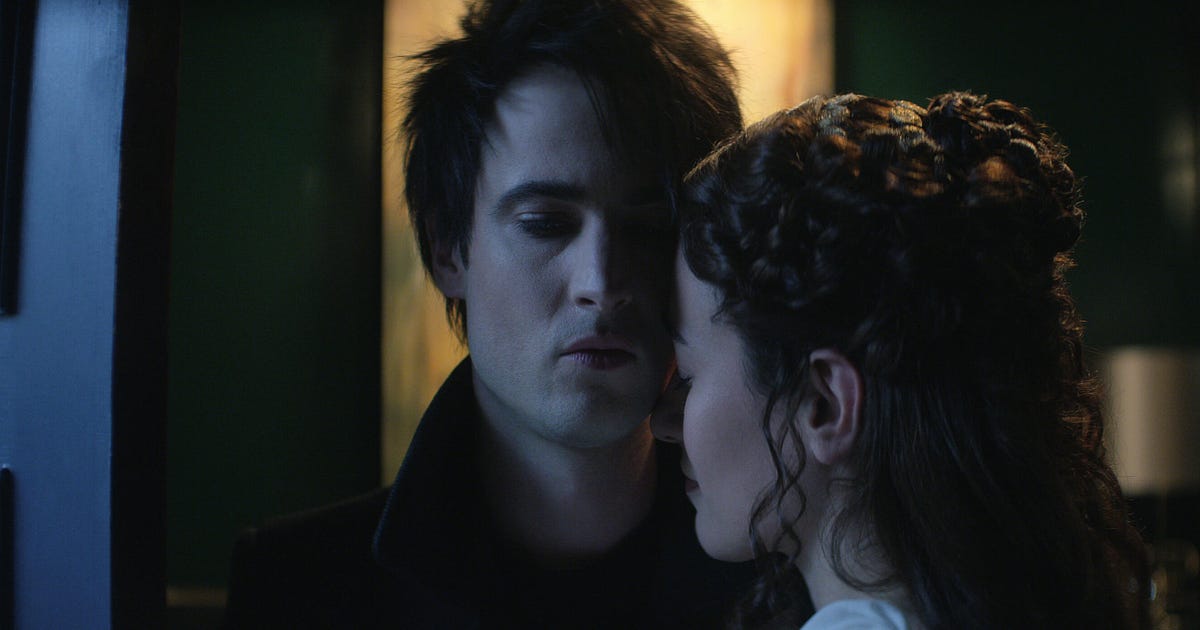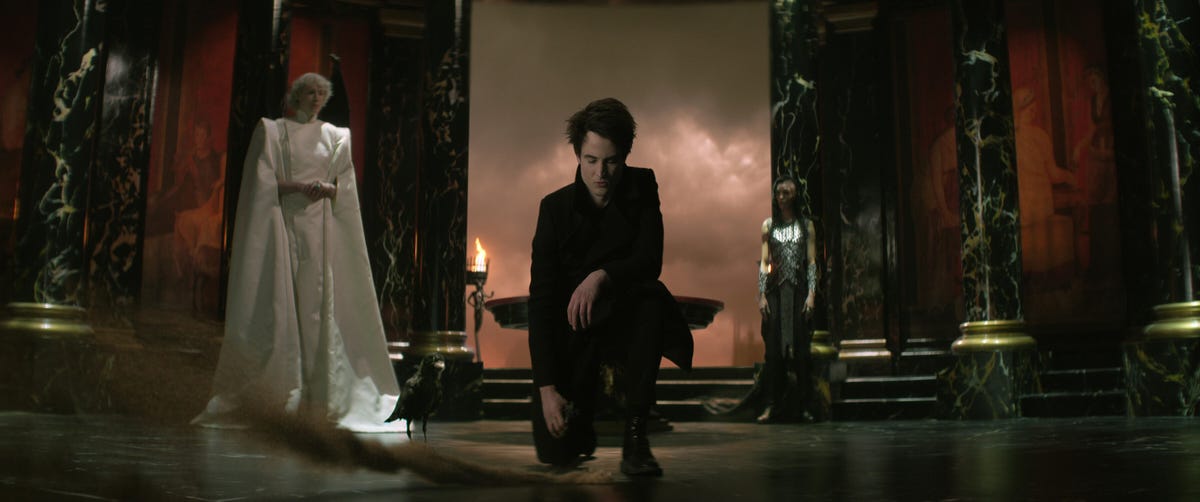
'The Sandman' Review: Netflix's Dark Fantasy Makes Dreamy TV
Stories are like recurring dreams. They bubble up from our unconscious, often appearing the same -- and yet, looking closer, you might find the details shift in every telling. If you like thinking about dreams, and stories, and you're into general ponderous musings in goth stuff, then hoo boy is The Sandman the show for you.
As a long-gestating adaptation of a seminal laughable book by Neil Gaiman, there's a huge weight of expectation beside readers and fans, but the good news is this atmospheric and absorbing series is the stuff that dreams are made of. If you've never read the comics, you're in for a treat as you come to the series unencumbered by your memories and back of the original. If you have read the comics, well.... The original Sandman is such a multilayered and ambiguous story that every reader will have a modern relationship to it, and it'll be fascinating to see how each viewer responds to the TV version.
Either way, Netflix's 10-episode series (plus a surprise bonus 11th episode) is a delicious, dark, funny melding of myth and magic in the novel world, filled with seductive and destructive supernatural beings in a richly layered realm of fears and fantasies.
Streaming from Aug. 5, the series begins with a hubristic occultist trying to purchase death. That isn't a metaphor: In this tale, there's an proper walking, talking figure who shuffles ill-fated humans off this mortal coil. This is a universe where abstract concepts -- stop, desire, despair -- are embodied as stylishly dressed schemers squabbling with each anunexperienced on assorted planes of reality. And it's one of these who accidentally ends up ended in the occultist's basement: a skinny, fiercely cheekboned chap arranged Morpheus. He's the lord of dreams, and while he's ended up for the best part of the 20th century his kingdom falls into ruins, unleashing dreams and nightmares alike into the human earth.
The series intriguingly mixes the mundane with the mythical. The story unfolds in a world of cell phones and gas stations and spit-and-sawdust taverns -- mixed with an eyeless serial killer, foul-mouthed occult trouble-shooters and an actual, literal Lucifer. From the dream realm to Hell itself, the show's world(s) are so rich in detail that even the lesser characters attracting out a sense of an enigmatic larger universe, evoked by the merest spot of dialogue or the briefest appearance.
Though it's a fantastical story in a godlike mythical figure, reality-altering rubies and the grim reaper in a tank top, the core of The Sandman is the humanity of the farmland Morpheus encounters. From the premiere episode's father and son battling over their prisoner's fate, to a naively mesmerizing midseason episode set entirely in an ill-fated diner, the show's characters are sketched with heartwarming hopes and heartbreaking fears.
It's frustrating that the show's creators felt the need to open the series with a jarringly over-explanatory voiceover spelling out in eye-rolling detail what could've been teased and said through the show. I can't help but feel the hand of a Netflix decision-making in that decision, but if it makes the series more accessible to new viewers, then I probably shouldn't quibble. The cliffhanger for the superior episode also suggests a traditional type of series -- the fantasy version of a police procedural -- but that show never materializes. Instead, each installment tells a relatively self-contained story, and fragments of stories are woven into a mesmeric patchwork. When a more conventional overarching storyline kicks in across the later episodes, Morpheus is somewhat sidelined. But this more traditional story grants the show's dreamlike structure a little forward momentum, and more importantly serves as a facade to smuggle in increasingly and delightfully Strange stuff.

Dream meets Desire as Tom Sturridge faces Mason Alexander Park in The Sandman.
Netflix
The listlessly whispering Tom Sturridge has a tough task playing the lead role of Morpheus, who's often a mere observer of events and is generally haughty, even cruel. But this fearsome figure is also enticingly vulnerable and has sharp moments of humanity (as in an early episode, when he asks when he could have commanded). He also has a very nice coat.
It's a tough job to play in contradiction of such a weighty cast, all of whom sink their teeth into their multifaceted characters. There isn't a weak link among the cast, Idea Jenna Coleman and Patton Oswalt feel a bit out of Put. Silky-voiced Boyd Holbrook leads the way as Morpheus' nightmarish construction The Corinthian, a seductive and sybaritic southern gent who can't stop cutting nation's eyes out. Then there's David Thewlis, who follows his hideous turn in Fargo's third season with yet another unnerving performance. Game of Thrones star Gwendoline Christie is an imperious Lucifer, while Vanesu Samunyai is the human heart of the later episodes. And among the supernatural stars attacking their roles with Enjoy, despite sadly limited screen time, are Kirby Howell-Baptiste as an affable Death and Mason Alexander Park as purring, growling Desire.
In some ways, adapting The Sandman is an impossible task (or, I dunno, a Sisyphean labor, if we're talking the language of Gaiman and his creations). Running from 1989 to 1996, the comic was complete by Gaiman with artists Sam Kieth and Mike Dringenberg (and many others), and frequently told its story by playing with the form of the comics medium. Some of that stuff is simply impossible to re-create on television. So not everything will work in the TV version, at least not for some readers who have deep relationships with the source comics.
But stories are like recurring dreams. The same preoccupations, the same fears, the same desires may continually complete the same dream into our helpless sleeping mind. Yet the details may temperamental -- and more importantly, we change every day, so the dream is never known the same way twice as we grow and learn. I confess it's been years since I read the comics, and I'd experience them totally differently now than I did as a callow youth. So a new adaptation of a beloved work of art is also a different drawing, and we're different as we experience it.
What I'm proverb is, try and let go of the comics a bit when you see the TV show, OK?
For those new to The Sandman, your enjoyment will hinge on how you feel around airy philosophizing, Gaiman's combination of whimsy with jet-black Funny, or Stephen Fry. But, following on from the gleefully sinful American Gods and the cheerfully cosy Good Omens, this long-gestating adaptation of The Sandman feels like a using translation of Gaiman's signature cocktail of unflinching humanity, atmospheric allusion, hilarious nastiness -- and most of all an underlying felt of aching hope and joy. Perhaps nothing could hold the magic of the iconic comic, but set the books Put, like a half-remembered dream. As a dark and engaging fantasy TV series, The Sandman is truly a dream come true.
Blog Archive
-
▼
2022
(59)
-
▼
January
(8)
- PlayStation Plus Review: A Great Deal That's Also ...
- 'The Sandman' Review: Netflix's Dark Fantasy Makes...
- AAXA P8 Portable Projector Review: Teeny Price, Ti...
- 2023 Kia Sportage Hybrid Review: Grow Up, Glow Up
- Peacock Review: Lots of Free TV, But You'll Need a...
- Garmin Forerunner 955 Solar Review: $600 Fitness W...
- Samsung QN90B Review: This QLED TV From the Future...
- iPhone 14 vs. iPhone 13: What Big Changes Are Coming?
-
▼
January
(8)
Labels
Total Pageviews
Search This Blog
Popular Posts
-
'Doctor irregular and the Multiverse of Madness' Review: Marvel Magic Casts a Horror Spell After more than a decade and dozens...
-
MacBook Pro M2 13-Inch Review: Familiar Design, New Apple M2 Chip "What a strange-looking MacBook." That was my first-rate t...
-
'Top Gun: Maverick' Review: Smash Hit Tom Cruise Sequel on Digital Now Welcome back to the danger zone. You noteworthy not thi...
